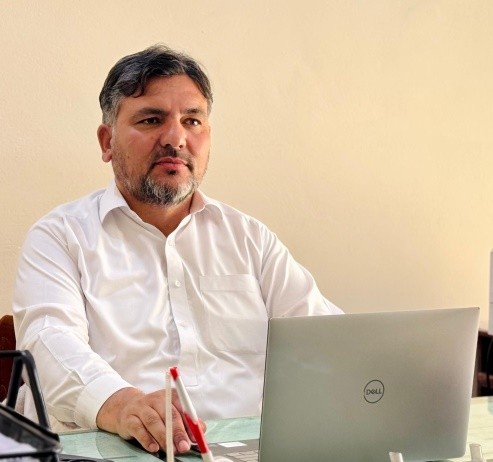Department of Pharmacy

Introduction
Pharmacy is a discipline concerned with the art and science of preparing medicines from natural and synthetic sources, making them suitable and effective for the treatment and prevention of diseases. It encompasses the identification, selection, isolation, formulation, analysis, standardization, pharmacological evaluation, and safe use of drugs and medicines.
The Department of Pharmacy is committed to producing legally qualified, professionally competent, and ethically responsible pharmacists who can contribute to hospitals, pharmaceutical industries, research organizations, academic institutions, community and retail pharmacies, and quality control laboratories. The role of pharmacists remains essential across all sectors of healthcare delivery.
Our Doctor of Pharmacy (Pharm-D) program (5 years, 198 credit hours) is designed in alignment with the curricular framework of the Pharmacy Council of Pakistan, the Higher Education Commission (HEC), and is consistent with the FIP Global Competency Framework. Students are trained in a competency-based, student-centered academic environment that emphasizes pharmaceutical care, interdisciplinary collaboration, evidence-based practice, and lifelong learning.
We remain committed to maintaining and exceeding national and international quality standards to ensure that our graduates are globally competitive, locally relevant, and ethically grounded.
The Department is supported by highly qualified and professionally experienced faculty, including nine PhD faculty members and one MPhil scholar. We are continually enhancing our facilities, which include state-of-the-art laboratories in:
- Pharmaceutical Chemistry Laboratory
- Pharmaceutics Laboratory
- Pharmacognosy Laboratory
- Industrial Pharmacy Laboratory
- Basic Medical Sciences Laboratory
- Pharmaceutical Microbiology Laboratory
- Quality Control Laboratory
- Instrumentation Laboratory
- Computer and IT Laboratory
Additionally, the Department houses a dedicated seminar library with more than 3,000 books in both print and digital form, as well as an animal house to support research and training. The Department of Pharmacy is fully committed to implementing and upholding the regulations and standards of the Pharmacy Council of Pakistan, HEC, and SBBU, ensuring excellence in academic delivery and the production of highly skilled pharmacy graduates.
Our Vision
The Department of Pharmacy aspires to become a leading Center of Excellence in Pharmaceutical Sciences at the global level—one that:
- Prepares pharmacy graduates not only for current professional demands, but also for the evolving future of the profession.
- Cultivates individuals who are not only effective healthcare team members, but also responsible, ethical, and impactful contributors to society.
- Excels in advanced education and high-quality research in drug sciences, contributing meaningfully to the improvement of human health, well-being, and global progress.
Our Mission
In pursuit of our vision, the Department of Pharmacy is committed to the following goals:
- Elevating the Department to the status of a full Faculty of Pharmacy.
- Revising and modernizing the existing pharmacy curriculum, aligning it with global standards and future professional requirements.
- Implementing comprehensive clinical pharmacy training for Pharm-D students across affiliated hospitals.
- Establishing a structured pharmacy residency program at the post-Pharm-D level, similar to internationally recognized models.
- Strengthening research capacity at the MPhil and PhD levels across all disciplines of pharmacy.
- Developing competent professionals, researchers, and leaders in the field of pharmacy who will contribute to innovative, ethical, and sustainable healthcare advancement both in Pakistan and globally.
Welcome to the Department of Pharmacy!

Dear Students,
It is my privilege to serve as the Chairman of this esteemed department and to lead the distinguished faculty, dedicated staff, and talented students who form our pharmacy family. As Chairman, I am pleased to share information about our academic programs, faculty achievements, and student success.
Our department has made remarkable progress in addressing the evolving needs of both students and patients. We are actively contributing to new advancements in drug discovery and development, pharmaceutical sciences, and translational clinical research.
Our university ranks among the leading institutions committed to shaping future healthcare professionals and empowering them to become valuable assets to our nation. To meet the challenges of tomorrow, we strive to provide high-quality professional education in a supportive and inspiring learning environment.
Pharmacy is a dynamic, diverse, and exciting field, serving as a vital component of the interdisciplinary healthcare system. This department is fully equipped to support your academic growth, skill development, and professional excellence. Our experienced and qualified faculty members are committed to teaching, mentoring, and sharing their expertise with dedication.
As we continue to strengthen our academic impact and expand our national and international influence through quality education and research, we welcome your valuable feedback, ideas, and participation.
I encourage you to actively engage in academic, research, and extracurricular activities within the department and the university. You are invited to explore our website or visit us in person—we are always here to welcome you. Together, let us move forward toward a bright and meaningful future.
.
Dr. Shujaat Ahmad, PhD (Postdoctoral, China)
Chairman, Department of Pharmacy
